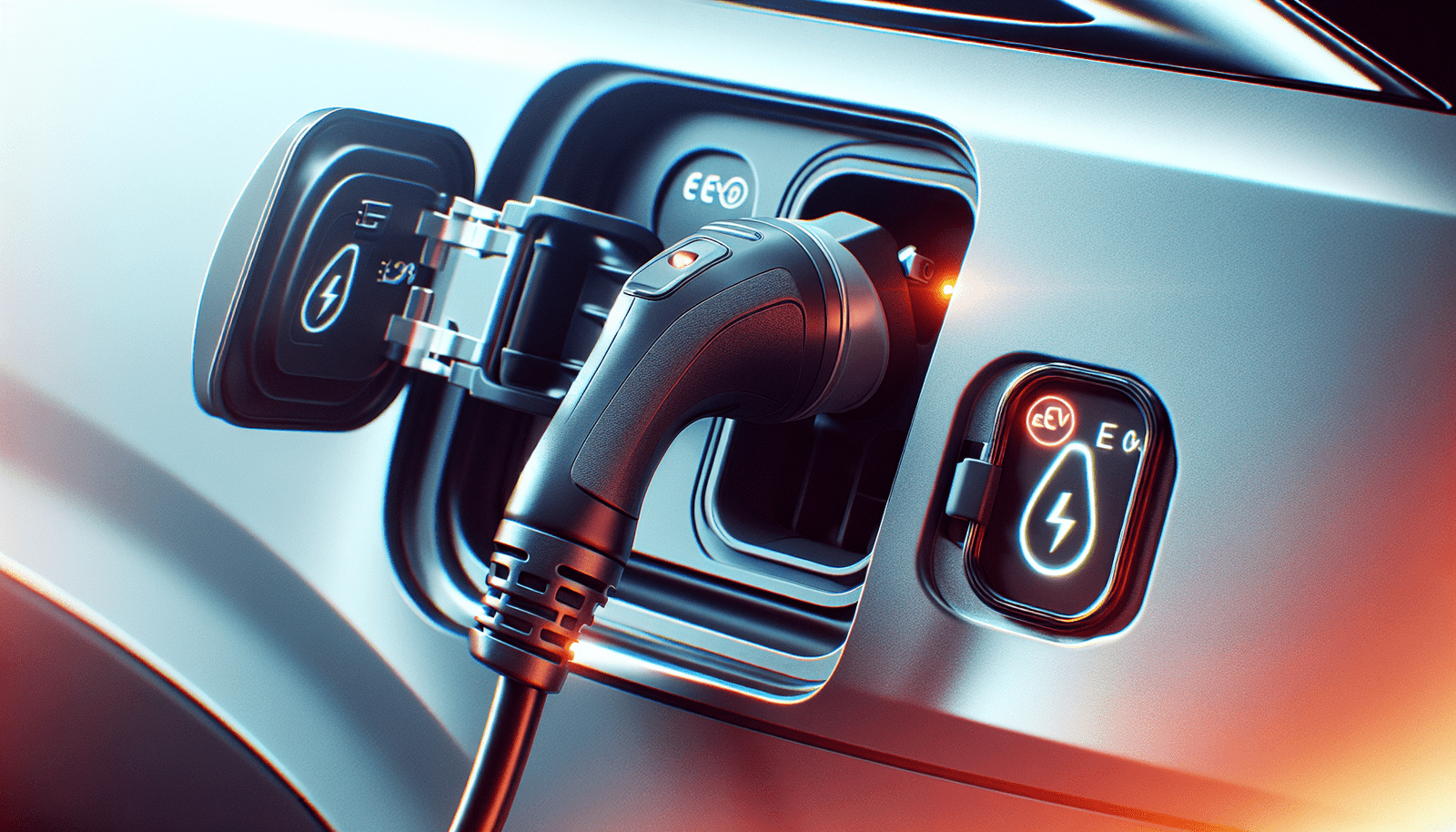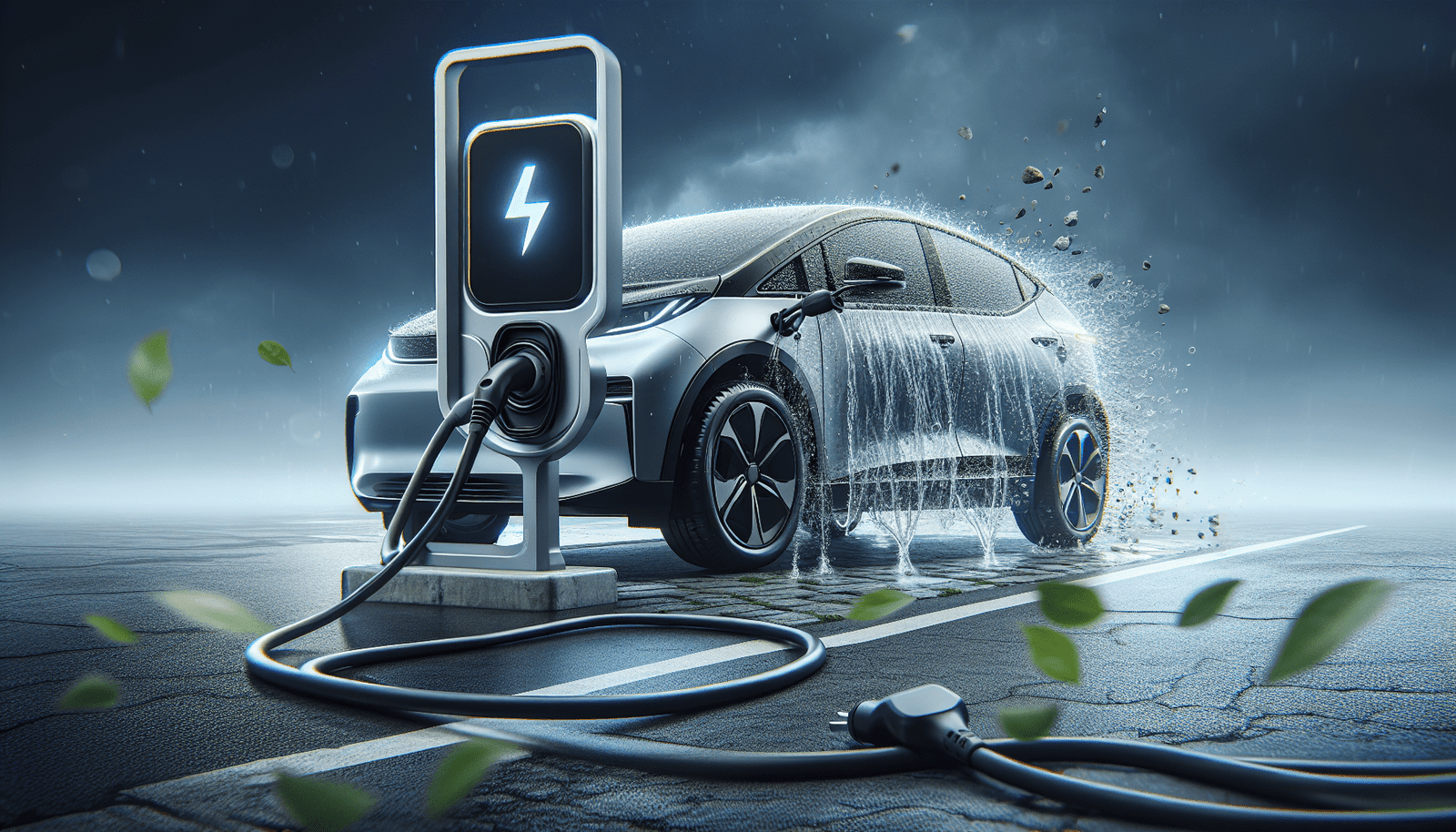Are you an avid electric vehicle user or someone searching for EV charger product reviews? Look no further! This article is here to provide you with all the answers to your frequently asked questions about outdoor EV charging solutions. We understand that you may have concerns and uncertainties, but fear not! We have crafted this content in a friendly and approachable tone to ensure that it is easy for you to understand. Plus, we’ve done our homework and used the latest SEO insights to ensure that this article is well-optimized for your online browsing convenience. So sit back, relax, and let us guide you through the world of outdoor EV charging solutions with expertise and ease. And don’t forget, at the end of this article, we’ll even give you a friendly nudge to start shopping online for your EV charging needs!
Understanding Outdoor EV Charging Solutions
Outdoor EV charging solutions refer to the infrastructure and equipment designed to charge electric vehicles (EVs) outside, whether in public spaces or private properties. These charging solutions are essential to meet the increasing demand for convenient and accessible charging options for EV owners.
The Need for Outdoor Charging Solutions
As the popularity of electric vehicles continues to rise, the need for outdoor charging solutions becomes evident. EV owners require access to reliable charging options while they are away from home. Outdoor charging stations provide convenience and peace of mind, allowing EV owners to charge their vehicles while they shop, work, or engage in other activities.
Brief History and Development of Outdoor EV Chargers
The development of outdoor EV chargers has been a result of the growing demand for sustainable transportation solutions. The concept of EV charging stations dates back to the early 1990s when the first public charging stations were installed in California. Since then, advancements in technology and infrastructure have enabled the widespread adoption of outdoor EV chargers.
Types of Outdoor EV Charging Solutions
There are several types of outdoor EV charging solutions available to cater to different charging needs. These include:
Level 1 Charging Stations
Level 1 charging stations are the most basic and common type of charging solution. They use a standard household outlet (120 volts) to charge electric vehicles. While they are convenient for overnight charging at home, they are relatively slow and may not be suitable for public charging.
Level 2 Charging Stations
Level 2 charging stations provide a faster charging option compared to Level 1. They require a higher-voltage power supply (240 volts) and can charge an electric vehicle at a rate of 10-60 miles of range per hour, depending on the vehicle and charger capacity. Level 2 charging stations are commonly found in public areas such as parking lots, workplaces, and shopping centers.
DC Fast Chargers and Superchargers
DC Fast Chargers, also known as Level 3 chargers, offer high-speed charging for EVs. They can charge a vehicle much faster than Level 1 and Level 2 chargers, providing up to 80% charge in as little as 20-30 minutes. These chargers are commonly found along major highways and in locations where quick charging is a necessity.
Tesla Supercharging Stations
Tesla Supercharging Stations are designed specifically for Tesla vehicles. These stations provide high-speed charging for Tesla EVs and are strategically located along popular travel routes. Tesla Superchargers offer faster charging speeds compared to regular Level 3 chargers, making long-distance travel more convenient for Tesla owners.
Mobile Chargers
Mobile chargers are compact and portable charging solutions that allow EV owners to charge their vehicles wherever they go. These chargers can be plugged into standard electrical outlets and are ideal for emergency charging situations or when a dedicated charging station is not available.
Solar Powered Chargers
Solar-powered chargers utilize renewable energy from the sun to charge electric vehicles. These charging stations feature solar panels that convert sunlight into electricity. Solar-powered chargers are an environmentally friendly option and are often found in locations where sustainability is a priority.
Pros and Cons of Outdoor EV Charging Solutions
Advantages of Outdoor EV Chargers
- Convenience: Outdoor EV chargers provide convenient charging options for EV owners while they are away from home.
- Accessibility: Public charging stations allow EV owners to charge their vehicles in various locations, enhancing accessibility and reducing range anxiety.
- Environmental Benefits: Using EV chargers powered by renewable energy sources, such as solar, reduces carbon emissions and promotes sustainable transportation.
- Cost Savings: Charging an EV at public charging stations can be more cost-effective compared to at-home charging, depending on electricity rates and incentives.
- Compatibility: EV chargers are designed to be compatible with a wide range of electric vehicles, ensuring accessibility for EV owners irrespective of their vehicle model.
Disadvantages of Outdoor Charging Points
- Availability: As the popularity of electric vehicles increases, there may be instances where the demand for charging stations surpasses the available infrastructure, leading to limited availability.
- Waiting Times: During peak hours, EV owners may experience longer waiting times at public charging stations, especially when fast charging options are limited.
- Reliance on Infrastructure: Outdoor charging solutions depend on the reliability and functionality of the charging infrastructure. Malfunctions or maintenance issues can temporarily render chargers unusable.
Choosing the Right Outdoor EV Charger
Selecting the appropriate outdoor EV charger requires careful consideration of several factors. These considerations include:
Factors to Consider When Choosing an EV Charger
- Charging Speed: Determine the charging speed required based on your driving habits and charging needs. Consider whether a Level 1, Level 2, or fast charger is most suitable for your EV.
- Compatibility: Ensure that the charger you choose is compatible with your electric vehicle’s charging specifications. Check for compatibility with the vehicle’s charging port and the appropriate charging standards.
- Power Capacity: Consider the power capacity of the charger and whether it aligns with your electrical system’s capacity. Ensure that your electrical circuit can handle the charger’s power requirements.
- Durability and Weather Resistance: Choose a charger with weatherproof and durable construction, especially for outdoor installations. Look for chargers with appropriate safety certifications to ensure reliability and longevity.
- Smart Features: Many modern chargers come with smart features such as connectivity options, scheduling capabilities, and monitoring functionalities. Consider these features based on your preferences and requirements.
The Best Outdoor Charger Brands on the Market
Some of the reputable outdoor EV charger brands include Tesla, ChargePoint, EVBox, ClipperCreek, and Siemens. These brands offer a range of options with varying features and capacities to cater to different charging needs. Research customer reviews and compare prices, warranty terms, and customer support options before making a purchase.
Installing Outdoor EV Chargers
When it comes to installing outdoor EV chargers, there are two main approaches: DIY installation and hiring professionals.
DIY Installation Process
If you are familiar with electrical work and have a basic understanding of electrical codes and safety measures, you may consider a DIY installation. However, it is crucial to consult local building codes and regulations to ensure compliance and safety. DIY installation typically involves steps such as selecting the charger location, mounting the charger, and connecting it to a suitable power source.
Hiring Professionals for Installation
For those without experience or expertise in electrical installations, hiring a licensed electrician or a professional EV charger installation service is recommended. These professionals have the knowledge and skills necessary to handle electrical connections and ensure compliance with building codes. They can also perform a site survey to determine the most suitable charger location and address any potential installation challenges.
Potential Installation Costs
The cost of installing an outdoor EV charger can vary depending on several factors including the charger type, electrical infrastructure, and installation complexity. On average, installation costs can range from a few hundred dollars for a basic Level 2 charger installation to several thousand dollars for more complex installations or when significant electrical upgrades are required. It is advisable to obtain multiple quotes from reputable installers to compare costs and services.
Maintaining Your Outdoor Electric Vehicle Charging Station
Proper maintenance of your outdoor EV charging station is essential to ensure its optimal performance and longevity.
Cleaning and Regular Maintenance
Regularly clean the charging station and remove any debris or dirt that may accumulate. Use a soft cloth and mild detergent to clean the exterior surfaces. It is important to avoid using harsh chemicals or abrasive materials that could damage the charger. Additionally, inspect the charging cables for any signs of wear or damage, and promptly replace them if necessary.
Troubleshooting Common Issues
Familiarize yourself with common issues that may arise with your charging station, such as charging interruptions or connectivity problems. Refer to the manufacturer’s instructions or consult their customer support for troubleshooting guidance specific to your charger model. In some cases, a simple reset or firmware update may resolve the issue.
When to Call in a Professional
If you encounter persistent issues or technical problems with your outdoor EV charging station that cannot be resolved through troubleshooting, it may be necessary to consult a professional technician or contact the charger manufacturer’s customer support. Professional assistance ensures proper diagnosis and repair of complex issues to maintain the charging station’s functionality.
Government Policies and Incentives for Outdoor EV Charging
Governments worldwide are implementing policies and providing incentives to encourage the adoption of electric vehicles and the development of charging infrastructure.
Recent Government Policies
Many countries have introduced regulations mandating the installation of EV charging infrastructure in public spaces, commercial buildings, and new residential developments. Governments are also investing in the expansion of charging networks, supporting research and development in EV technology, and offering financial incentives for EV purchases and charging infrastructure installation.
Available Financial and Tax Incentives
Government incentives for EV charging may include grants, tax credits, rebates, or subsidies to offset the costs of purchasing and installing charging infrastructure. These incentives aim to incentivize individuals and businesses to invest in EV charging solutions and promote the transition to cleaner transportation alternatives.
Relevant Environmental Regulations
To address climate change and reduce greenhouse gas emissions, governments are implementing stricter environmental regulations that promote the adoption of electric vehicles and the expansion of EV charging infrastructure. These regulations encourage businesses and public entities to invest in outdoor EV chargers to support sustainable transportation options.
General Safety Measures for Outdoor EV Chargers
Ensuring the safety of users and the charging infrastructure is paramount when utilizing outdoor EV chargers. Adhering to basic safety precautions and guidelines is crucial.
Basic Safety Precautions
- Follow the manufacturer’s instructions and guidelines for the proper use of the charging station.
- Only use chargers that are in good condition and have appropriate safety certifications.
- Regularly inspect charging cables and connectors for any signs of wear or damage.
- Keep the charging station and surrounding area clear of any flammable materials or obstructions.
- Avoid tampering with the charging station or attempting repairs without proper knowledge or expertise.
Dealing with Weather Conditions
Outdoor EV chargers are exposed to various weather conditions, including rain, snow, and extreme temperatures. It is important to choose chargers specifically designed for outdoor use and ensure they have appropriate weather resistance ratings. Additionally, consider installing charging stations in covered or sheltered areas to protect them from direct exposure to the elements.
Avoiding Overcharging and Other Safety Risks
It is essential to avoid overcharging your electric vehicle to prevent potential safety risks. Most EVs and chargers have built-in safety features to prevent overcharging, but it is still important to monitor the charging process and follow recommended charging times and levels. Always use charging cables and connectors that are compatible with your EV and charger to ensure proper electrical connections and minimize safety risks.
The Future of Outdoor EV Charging Solutions
The future of outdoor EV charging solutions looks promising, with advancements in technology and infrastructure set to revolutionize how we charge our electric vehicles.
Emerging Technologies in EV Charging
Future developments in EV charging technology include wireless charging, where charging occurs through electromagnetic induction without the need for physical cables. Additionally, advancements in battery technology, such as faster-charging capabilities and increased energy density, will further enhance the convenience and efficiency of outdoor EV charging.
How Infrastructure Developments Will Improve Outdoor Charging
The expansion and improvement of charging infrastructure are crucial for the widespread adoption of electric vehicles. Governments and private entities are investing in the development of fast-charging networks and increasing the number of charging stations to eliminate range anxiety and support long-distance travel. The integration of renewable energy sources, such as solar power, into charging infrastructure will also contribute to a sustainable and environmentally friendly charging ecosystem.
Common FAQs About Outdoor EV Charging Solutions
Answering Top Queries from Users
-
Can I charge my electric vehicle at any outdoor charging station?
- Yes, most public outdoor charging stations are compatible with a wide range of electric vehicle models. However, it is advisable to check for compatibility before using a charging station to ensure it supports your specific EV.
-
How long does it take to charge an electric vehicle at an outdoor charging station?
- Charging times vary depending on several factors, including the charger type, the capacity of your EV’s battery, and the initial level of charge. Level 1 and Level 2 chargers typically require several hours to fully charge an EV, while Level 3 chargers can provide a significant charge in as little as 30 minutes.
-
Can I use my electric vehicle’s portable charger at an outdoor charging station?
- Portable chargers, also known as Level 1 chargers, are generally not compatible with outdoor charging stations as they utilize different electrical configurations. Outdoor charging stations usually require Level 2 or Level 3 chargers that provide higher voltage and faster charging speeds.
-
Are outdoor charging stations free to use?
- The availability and cost of using outdoor charging stations vary depending on the location and service provider. Some public charging stations offer free charging, while others require payment either through a subscription or a pay-as-you-go model. It is advisable to check pricing information and any associated fees before using a charging station.
Myths and Misconceptions about Outdoor EV Charging Solutions
-
Myth: Outdoor EV chargers are prone to electrical malfunctions and safety hazards.
- Reality: Outdoor charging stations are designed with safety features and undergo rigorous testing to ensure compliance with electrical codes and standards. Proper installation and regular maintenance minimize the risk of malfunctions and safety hazards.
-
Myth: Outdoor EV chargers are slow and inconvenient compared to traditional gasoline refueling.
- Reality: While charging times for electric vehicles may be longer compared to refueling with gasoline, outdoor charging solutions offer convenience and flexibility. EV owners can charge their vehicles overnight at home or utilize public charging stations while engaging in various activities.
-
Myth: Outdoor charging stations often run out of power and are unreliable.
- Reality: Public charging networks strive to maintain sufficient power supply and monitor the usage of charging stations. While instances of charging station unavailability may occur during peak hours, improving infrastructure and network expansion efforts aim to address this issue and enhance reliability.
At the end of the FAQ section, include a call to action encouraging readers to shop online.
We hope this comprehensive article has provided you with a clear understanding of outdoor EV charging solutions. With the increasing adoption of electric vehicles, the need for convenient and accessible charging options has become crucial. From Level 1 chargers to advanced DC fast chargers and emerging technologies, there are various options available to cater to different charging needs. When choosing an outdoor EV charger, consider factors such as charging speed, compatibility, power capacity, and durability. Proper installation, maintenance, and adherence to safety measures are essential for reliable and safe charging experiences. With government policies and incentives encouraging the development of charging infrastructure, the future of outdoor EV charging solutions is promising. As technology continues to evolve, we can expect more efficient and sustainable charging options. If you have any more questions or require further assistance, feel free to reach out to the professionals in the field or explore reputable brands that offer outdoor EV charging solutions online. Happy charging!




